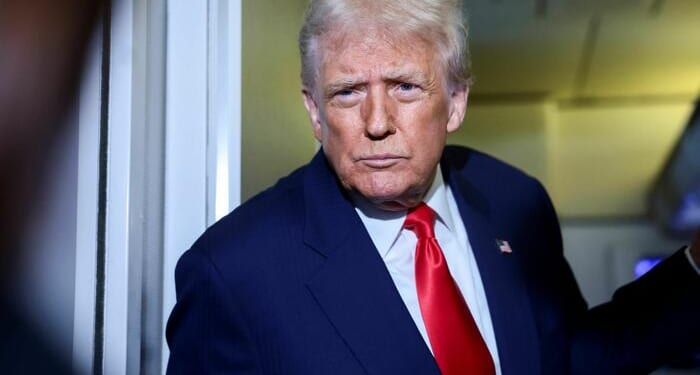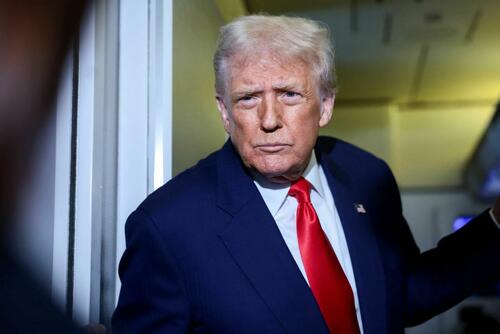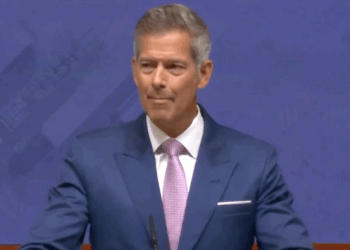President Trump is pounding the table for Senate Republicans to “play their TRUMP CARD” – demanding they scrap the chamber’s 60-vote filibuster rule to push through a stopgap bill to end the government shutdown. But despite the former president’s fiery Truth Social post Thursday night, GOP senators – wary of detonating the so-called “nuclear option” – are crickets.
Fresh off a trip to Asia, Trump said he faced questions overseas about why “powerful Republicans allowed” Democrats to shut down the government – and called on his party to act fast. “It is now time for the Republicans to play their ‘TRUMP CARD,’ and go for what is called the Nuclear Option – Get rid of the Filibuster, and get rid of it, NOW!” he wrote.
Under current Senate rules, most legislation, including funding measures, requires 60 votes to advance. Republicans hold just 53 seats, and while a few Democrats have occasionally sided with them on procedural votes, others, like Sen. Rand Paul (R-Ky.), have defected in the opposite direction. That math leaves Trump’s call a political long shot.
Johnson’s caution: “If the shoe was on the other foot…”
At a Friday press conference, House Speaker Mike Johnson (R-LA) didn’t directly break with Trump but made clear he’s wary of tampering with one of the Senate’s oldest guardrails.
“The filibuster has traditionally been viewed as a very important safeguard,” Johnson said. “If the shoe was on the other foot, I don’t think our team would like it.”
Johnson warned that eliminating the rule could pave the way for Democrats to grant statehood to Washington, D.C., and Puerto Rico – adding two likely Democratic senators – or ram through sweeping gun bans and other progressive priorities. He described Trump’s Truth Social broadside as “another expression of frustration, of the anger that has been felt, the anger by the President.”
Senate Republicans draw the line
Many Senate Republicans, especially veterans of the chamber, fear that once the filibuster is gone, there’s no going back. They say the rule forces both sides to seek compromise — and protects whichever party ends up in the minority.
“The filibuster forces us to find common ground in the Senate. Power changes hands, but principles shouldn’t,” Sen. John Curtis (R-UT) wrote Friday, calling himself a “firm no” on eliminating it.
Senate Majority Leader John Thune (R-SD) – who has made preserving the legislative filibuster a central part of his leadership – also isn’t budging. “Leader Thune’s position on the importance of the legislative filibuster is unchanged,” a spokesman said Friday.
Thune has already faced pressure from the right, including Rep. Marjorie Taylor Greene (R-Ga.), to cave to Trump’s demands. But he and other Republicans insist that the short-term gain of reopening the government with a simple-majority vote isn’t worth the long-term fallout.
Even if Thune wanted to change course, he likely lacks the votes. Several Senate Republicans have said they won’t go along with any effort to end the 60-vote rule through the nuclear option — a parliamentary maneuver that lets the majority change Senate precedent with a simple majority.
Advocates of the move claim it could be narrowly written to apply only to spending bills. But critics warn that in practice, any change to the Senate’s precedents would effectively kill the filibuster for all legislation – opening the floodgates to one-party rule whenever control flips.
“It would be a drastic move for such a limited win as a stopgap spending bill,” one GOP aide told reporters.
Trump’s long-running feud with the filibuster
This isn’t the first time Trump has tried to “neuter” the filibuster. During his first term, he repeatedly urged then-Majority Leader Mitch McConnell (R-KY) to nuke it. McConnell, who made masterful use of the rule to stall Democratic priorities for years, refused.
Democrats, for their part, tried to kill the filibuster themselves in 2022 to pass election-law changes – but failed when Sens. Joe Manchin ( D-West VA) and Kyrsten Sinema (I-AZ) joined Republicans in opposition.
For now, Trump’s push appears to be more about political pressure than practical policy. Johnson and Senate GOP leaders are holding the line, warning that once the filibuster is gone, there’s no putting the genie back in the bottle.
Loading recommendations…


















